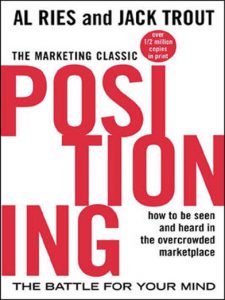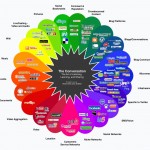
by Alex Patton | Mar 7, 2013 | Political Consulting
I was having lunch with a client this past week, and I was told in no uncertain terms of a mutual acquaintance that does not like me personally.
In fact, it was expressed to me that this person hates the living daylights out of my guts. Let’s set aside the fact that he and I have never had a conversation and have most likely have said ‘hello’ to each other twice in passing. (Let’s also set aside that I am a extremely lovable & loyal guy.)
It was explained to me that he hates my guts because he doesn’t like that “Alex Patton engages in negative campaigning.”
This conversation was running through my head as I went home and re-read a classic book by Al Ries and Jack Trout, “Positioning: The Battle for your Mind”.
I last read the book about 5 years ago, but you could tell from my scribbles in the margins and markup, I liked the book.
I think my favorite line from the book:
“culture and refinement may be admirable qualities, but not in advertising.”
Positioning: The Battle for your Mind, pg 69
I often think about that quote and the book when working with political clients.
Here is another quote from the book that seems appropriate:
“to climb on his or her product ladder, you must relate your brand to the brands already in the prospect’s mind.”
Positioning: The Battle for your Mind, pg 69
This is especially true when a candidate is challenging an incumbent.
Let’s relate a campaign to a business endeavor, since so many business people think they have the political answers.
The situation is you are a challenger to an incumbent or brand leader. You, the challenger, are now going after market share in the voters mind. A space that we can assume the incumbent is the market leader with at some point receiving at least 50% plus 1 market share.
What to do?
I have seen way too many candidates make the childish, amateurish mistake of challenging the brand leader for market share and attempt do it without mentioning the brand leader.
A candidate can not write a campaign speech not mentioning the incumbent and not comparing yourself directly to the incumbent. It is a recipe for a complete disaster. After all, if a challenger is no different, then the consumer will remain with the market leader.
If a candidate is challenging the incumbent,”you must relate your brand already in the prospect’s mind” otherwise a candidate best be prepared to spend ungodly amounts of money in an endeavor still likely to have a low probability chance of dislodging the market leader.
If a candidate does not have the confidence to position him/her self against the brand leader and explain how he/she is different, the challenger will never break through the clutter and noise of a campaign. A challenger will say a lot, yet at the same time say absolutely nothing.
A challenger will campaign and most likely run a campaign that he/she finds to be “cultured and refined”. Congratulations, you just got your butt kicked. Please, enjoy the opera.
Let’s be clear, I do not take joy in negative campaigning nor do I use it in every campaign. However, when the situation calls for it, we will not hesitate to perform our duties for our clients to help them navigate to victory.
And you know what? I am okay with that.
PS. And to prove that I am such a lovable guy, I will be sending a copy of the book to some of my ‘favorite’ unsuccessful candidates, maybe they can read it and re-tool for their next run.

by Alex Patton | Feb 28, 2013 | Political Media, Political Research
Florida’s Elected Officials’ Score Low Grades in Twitter Sociability, Forgetting the ‘Social’ in Social Media.
Landmark Twitter study released: Politicians talk too much, listen too little
Ozean Media releases the landmark study of Twitter usage of Florida’s elected officials including Federal, Statewide, & State Legislature officials. OMG! Don’t Forget: It’s Social Media: A Report Card of Florida’s Elected Officials Use of Twitter is the most comprehensive review of Twitter usage by Florida’s politicians to date.
“Overall, Republicans earn a C and Democrats an F in twitter usage; however, when we grade on a curve Florida’s Republican officials perform better than the Democratic officials. The good news is there is room for dramatic improvement,” said Alex Patton (@alex_patton), the study’s author.
Questions:
The study researched over a two week period set out to answer the following questions:
- Are Florida’s elected officials using Twitter?
- Is there a digital divide that separates Republican and Democrat elected officials in Florida?
- How are Florida’s elected officials using Twitter?
- Which of Florida’s elected officials could be considered to be embracing Twitter?
- Are there recommendations to be made to Florida’s elected officials in their use of Twitter?
The study represents the most comprehensive look at twitter usage of Florida’s elected officials, aggregating data from multiple sources and comparing the data to twitter superstars such as the University of Florida, President Obama, and Justin Bieber.
Findings of Study:
- As a whole, Florida’s elected officials are using Twitter in greater percentages than the general public.
- Florida’s elected Republican officials are using social media more than Florida’s elected Democrat officials – 57% of Republican elected officials are active users (defined as at least 1 status update in past 7 days) to 34% of Democrat elected officials.
- Republican elected officials are doing significantly better than Democrat elected officials using twitter.
- If not for Florida’s Democratic Congressional Delegation — more specifically @DWStweets who alone accounts for 85% of the number of followers for Democrat elected officials — Florida’s Democrat elected officials would have little social media reach.
- Florida’s elected officials score well on influence, on authority; however,
- Florida’s elected officials score very low on outreach.
- A handful of Florida’s elected officials are embracing Twitter. They are:
| category |
Twitter name |
name |
district |
party |
| USREP |
@RepDennisRoss |
Dennis Ross |
15
|
Republican |
| USREP |
@DWStweets |
D Wasserman Schultz |
23
|
Democrat |
| USREP |
@treyradel |
Trey Radel |
19
|
Republican |
| STSEN |
@Rob_Bradley |
Rob Bradley |
7
|
Republican |
| STSEN |
@DwightBullard |
Dwight Bullard |
39
|
Democrat |
| STREP |
@sethmckeel |
Seth McKeel |
40
|
Republican |
| STREP |
@repclayingram |
Clay Ingram |
1
|
Republican |
| STREP |
@JimmyPatronis |
Jimmy Patronis |
6
|
Republican |
| STREP |
@mattgaetz |
Matt Gaetz |
4
|
Republican |
| STREP |
@jasonbrodeur |
Jason Brodeur |
28
|
Republican |
“Bottom line, when you look at how Florida’s politicians are actually using Twitter, they are forgetting the ‘social’ in social media. The vast majority of Florida’s elected officials appear to be misunderstanding or misusing Twitter by using it as primarily as a broadcast media channel,” continues Mr. Patton.
“For Florida’s elected officials to truly realize the power of Twitter and social media, they must embrace the social part by talking with people, not only talking to people,” concludes Alex Patton.
The study, an executive summary, the study’s methodology, and complete data-set are available for download below.
All are invited to comment on the report using the Twitter hashtag #socialgrade.
Downloads
Press Release
Download Press Release (filetype: pdf)
Study
Download Complete Study (filetype:pdf)
DataSet
Download dataset (Excel Sheet – .xlsx)
Download dataset (Excel Sheet – .xls)
Download dataset (Tab Delimited Txt – .txt)
P.S. A little favor Request
Ozean hopes that in consideration of release of the study for free; you will grant one request:
If you like the study and/or find the the information useful, please share this page using the buttons below.
We thank you!

by Alex Patton | Feb 19, 2013 | Political Media
 Pew Research Center recently released a study finding that minorities are increasingly outnumbering whites in their use of certain social media platforms.
Pew Research Center recently released a study finding that minorities are increasingly outnumbering whites in their use of certain social media platforms.
The study entitled, “The Demographics of Social Media Users — 2012”, shows that in general, Blacks and Hispanics are more likely to use social media sites than whites (percentage wise)and almost twice as likely to use twitter & Instagram.
Social Networking Sites
% of internet users who use social networking sites
Use Social Networking Sites All internet users (n=1,802) 67%
Race/ethnicity
a White, Non-Hispanic (n=1,332) 65%
b Black, Non-Hispanic (n=178) 68%
c Hispanic (n=154) 72%
The study goes on to make a point that Urban users are using all social media channels more than suburban or rural users.
Guess what? Republicans can do better among all minorities and Urban dwelling voters.
This study makes no mention of HOW minorities or anyone for that matter are using social media to interact with politics; however, the high use alone should be a further wake up call for changing Republicans’ political outreach strategy.
If Republicans are to get serious about minority outreach, as a Party we must study and understand how these new social media channels can assist us in the effort because it would appear the digital divide exists more in Republicans’ mindset than in actuality.
To read more of the study.

by Alex Patton | Feb 15, 2013 | Ozean Media
The term ‘freemium’ was coined to refer to any software or service offered for free use, but offers some some enhanced functionality if the user or organization pays a monthly or annual fee. Notable examples include DropBox, who offers 2GB 5GB of online storage for free — up to 1TB for paying users — or Pandora, who offers free Internet radio but allows paying customers track skips and an ad-free experience.
While ten years ago paying for a service such as Internet radio would be regarded as a frivolous expense, there are a growing number of paying subscribers who would contend such an expense is just as vital as keeping the electric bill paid. According to an internal survey, 67% of Pandora listeners said the company’s Internet radio service made a positive impact on their life. When narrowed to just the musical experience, some 84% said Pandora connects them with the music they love. With stats like that, who wouldn’t want to listen to, or advertise on, Pandora?
A recent survey showed 67% of listeners said Pandora had positive impact on their life.
But this presents a real problem for advertisers.
Let’s take Pandora; with over 80 million registered users, they’re arguably the widest reaching internet radio platform — a lucrative advertising medium to spend our media budgets on. Here I am, Mr. Media Buyer, trying to target the Pandora’s most loyal listeners, particularly ones who have disposable incomes what most would consider a
Add to that the psychological effect on a user who pays for a service he or she was already getting for free: they use it a heck of a lot more. After all, if I’m catching grief from my penny-pinching wife on spending six bucks a month on some internet radio service she gets on her iPhone for free, I had better spend every waking minute of the day using it. This means the users with the highest frequency to the site are excluded from my advertising reach.
For a company like Pandora, it equates to the users with the highest listening hours per month — with the greatest chance of seeing my client’s ad — are totally off limits to my campaign. This makes it a harder sell to clients, knowing that a sweet piece of a pie will never hear their clever ad.
Even with that considered, advertising on freemium services is far from a bad option. This stands especially true if you’re targeting the coveted 18-25 demographic, who’ve all seemed to embrace conventional-media-replacing services like Pandora and Hulu.
It’s a limitation, not a deal breaker, but I sure hope these service providers fully explore every option before excluding the crème de la crème to us media buyers.
by Alex Patton | Feb 14, 2013 | Political Research

Network Analysis
As I have written before, I am becoming obsessed with two things: the study of persuasion and the study of networks and their effects on the political process.
Today, a fellow political consultant sent me the following link to a Ted Talk by James B. Glattfelder.
The Ted talk was entitled “Who controls the world?”
sidenote: some copy writer some where knew exactly how to write a headline that would make every political geek in the world click. Nicely done!
This is NOT the old 80/20 rule, this is a network analysis showing exactly how a few emerge from a large, complex network to exert massive amounts of power.
The political implications of this study are enormous. If you are as interested as I am in this topic, please read the entire study, “The Network of Global Corporate Control”.
If you don’t want to read it, then listen to the Ted Talk. It is 14 minutes well spent. I promise!







